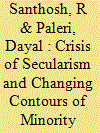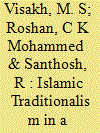| Srl | Item |
| 1 |
ID:
181883


|
|
|
|
|
| Summary/Abstract |
This paper examines the changing nature of Muslim political mobilization in contemporary India in the context of Hindu nationalism’s ascendancy into power and the consequent crisis of traditional Muslim politics. Through an ethnographic case study of the Popular Front of India, we argue that a qualitatively new form of political mobilization is taking place among Indian Muslims centered on an articulation of “self-defense” against a “Hindu nationalist threat.” This politics of self-defense is constructed on the reconciliation of two contradictory processes: use of extensive legal pragmatism, and defensive ethnicization based on Islamic identity. The paper also examines the consequences of the emerging politics of competing ethnicization for even a normative and minimal idea of secularism and how it contributes to the process of decoupling of secularism and democracy in contemporary India.
|
|
|
|
|
|
|
|
|
|
|
|
|
|
|
|
| 2 |
ID:
181126


|
|
|
|
|
| Summary/Abstract |
In our ethnography among traditionalist Sunni Muslims of Kerala, South India, we observe the emergence of new intellectual critiques of Islamic reformism and a revival of ‘traditional’ Islamic articulations. A new class of traditionalist Sunni ulama, claiming to be ‘turbaned professionals’, plays an instrumental role in providing epistemic sanctioning to ‘traditional’ Islamic piety while simultaneously grounding it within the discourses and processes of neoliberal developmentalism. Such assertions of traditionalist Sunni Muslim identity challenge the conventional understanding of Islamic reformism as a hallmark of the progressive understanding of faith and traditionalism as its ‘anti-modern’ other. The article argues that this discursive shift of Sunni Islamic traditionalism in Kerala since the 1980s from defensive to more assertive forms has to be located in the context of wider socio-economic change within the community facilitated by structural as well as cultural forces of globalization. We point out that this process traverses the local, national, and global scales of identification, and results in intense negotiations between local identifications and ‘true Islamicate global imaginations’. These negotiations bring in new discourses around the question of ‘authentic’ Islamic practices and sensibilities among the traditionalist Sunni Muslims, forcing us to locate the question of their identity formation beyond the boundaries of communities and the nation states that ensconce them.
|
|
|
|
|
|
|
|
|
|
|
|
|
|
|
|